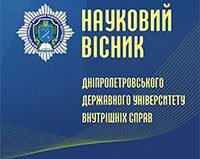Vadym KHASHEV
KHASHEV V. (2022), Leaving in danger: certain debatable aspects of improving criminal liability, Scientific Bulletin of Dnipropetrovsk State University of Internal Affairs, №4, 286-291
DOI: 10.31733/2078-3566-2022-4-286-291
ABSTRACT. Separate debatable aspects of improving the legal regulation of criminal liability for leaving in danger, as one of the crimes against life and health of a person, have been considered. The author has emphasized that the proper criminal and legal protection of the life and health of every person is of great importance for our state, since the full-scale invasion of the troops of the russian federation on February 24, 2022 caused the death and injury of a significant number of not only our military defenders, but also the civilian Ukrainian population. In particular, the proposal regarding the expansion of the circle of victims of the act provided for in Part 2 of Article was supported. 135 of the Criminal Code, due to the recognition of such minor children. And to the circle of perpetrators who should bear increased responsibility for leaving a minor child in danger next to the mother, it is advisable to add the father and the guardian. It is noted that the legal obligation to take care of minors, in addition to the mother and father, can also be assigned to the person who has registered guardianship over the child. And today, the institution of guardianship is of great importance for ensuring the normal development of young children, since many Ukrainians died as a result of military operations and their children remained orphans. The guardian actually replaces the minor child’s parents, accordingly, the level of social danger of the guardian’s action, which consists in leaving the child entrusted to him in danger, is no less than that of a mother or father, and therefore the responsibility should be more strict than that provided for in 1 Art. 135 of the Criminal Code.
In addition, it has been considered expedient to examine the issue of adding Art. 135 of the Criminal Code of Ukraine as a new qualified type, which will provide for liability for leaving in danger by a mother who is in a condition caused by childbirth, immediately after giving birth to her newborn child, which caused her death or other serious consequences. In such an act, the punishment should be less severe than for the intentional killing by a mother of her newborn child. This will eliminate the inconsistency of sanctions between Art. 117 of the Criminal Code and Part 3 of Art. 135 of the Criminal Code, according to which the act of a mother who was in a state caused by childbirth and left a newborn child in danger immediately after childbirth, which caused its death or other serious consequences, is punished more severely than the intentional killing by the mother of her newborn child during childbirth or immediately after childbirth. It has been noted that the necessity of such a legislative step, as well as the size of the sanction for its commission, requires a separate criminal-legal and criminological study.
Keywords: leaving in danger, deliberate killing by the mother of her newborn child, criminal offenses against human life and health, duty of care, guardianship.
References
- Konstytutsiya Ukrayiny vid 28.06.1996. [Constitution of Ukraine dated June 28, 1996]. URL : https://zakon.rada.gov.ua/laws/show/254%D0%BA/96-%D0%B2%D1%80. [in Ukr.].
- Babanina, V. V. (2010) Kryminalna vidpovidalnist za zalyshennia v nebezpetsi [Criminal responsibility for leaving in danger] : avtoref. dys. … kand. yuryd. nauk : 12.00.08 / Kyiv. nats. un-t vnutr. sprav. Kyiv, 20 p. [in Ukr.].
- Babanina, V. V. (2009) Zalyshennia v nebezpetsi: kharakterystyka obiekta zlochynu [Leaving in danger: characteristics of the object of the crime]. Visnyk Kyivskoho natsionalnoho universytetu vnutrishnikh sprav. № 3 (64), pp. 132–137. [in Ukr.].
- Pro uzahalnennia sudovoi praktyky rozghliadu kryminalnykh provadzhen shchodo zlochyniv proty zhyttia i zdorovia osoby za 2014 r. [On the generalization of judicial practice of consideration of criminal proceedings regarding crimes against life and health of a person in 2014] : Postanova Plenumu Vyshchoho spetsializovanoho sudu Ukrainy z rozghliadu tsyvilnykh i kryminalnykh sprav vid 3 chervnia 2016 roku № 3. URL: http://consultant.parus.ua/?doc=0A9QI5E51C [in Ukr.].
- imeinyi kodeks Ukrainy vid 10.01.2002 [Family Code of Ukraine dated January 10, 2002 No. 2947-III.]. URL: https://zakon.rada.gov.ua/laws/show/2341-14#Text. [in Ukr.].
- Babanin, S. V., Korohod, S. V. (2021) Udoskonalennia sanktsii kryminalno-pravovykh norm v umovakh zaprovadzhennia vidnovnoho pravosuddia [Improvement of sanctions of criminal law norms in the conditions of introduction of restorative justice]. Naukovyi visnyk Dnipropetrovskoho derzhavnoho universytetu vnutrishnikh sprav. Spec. issue № 2, pp. 365–370. [in Ukr.].
- Ostapenko, L. (2005) Pravova otsinka prychetnosti do vbyvstva matiriu svoiei novonarodzhenoi dytyny [Legal assessment of complicity in the murder of a mother of her newborn child]. Pidpryiemnytstvo, hospodarstvo i pravo. № 6, pp. 128–131. [in Ukr.].
- Khashev, V. H. (2015) Problemni pytannia kryminalnoi vidpovidalnosti za umysne vbyvstvo matiriu svoiei novonarodzhenoi dytyny [Problematic issues of criminal responsibility for the intentional killing of a mother of her newborn child]. Naukovyi visnyk Dnipropetrovskoho derzhavnoho universytetu vnutrishnikh sprav. № 2, pp. 238–244. [in Ukr.].
